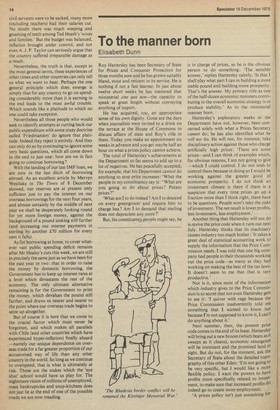To the manner born
Elisabeth Dunn
Roy Elattersley has been Secretary of State for Prices and Consumer Protection for three months now and he has grown suitably bland, stout and reticent in its service. He is nothing if not a fast learner. In just about twelve short weeks he has mastered that ministerial sine qua non—the capacity to speak at great length without conveying anything of import.
He has acquired, too, an appropriate sense of his own dignity. Gone are the days when journalists were invited to a drink on the terrace at the House of Commons to discuss affairs of state and Roy's role in them. Today you make an appointment six weeks in advance and you get maybe half an hour on what a prices policy cannot achieve.
The total of Hattersley's achievements at the Department so far seems to add up to a lot of negatives. He has peacefully accepted, for example, that his Department cannot do anything to stop price increases: 'What the people in my constituency say is: "What are you going to do about prices? Potato prices?"
'What am Ito do indeed ? Am Ito descend on every greengrocer and require him to charge less? Am Ito demand that sterling does not depreciate any more?'
But, his constituency people might say, he is in charge of prices, so he is the obvious person to do something: 'The sensible answer,' replies Hattersley calmly, 'Is that I shall play what part I can in building a more stable pound and building more prosperity.
That's the answer. My primary rOle as one of the half-dozen economic ministers contributing to the overall economic strategy is to produce stability.' As to the ministerial manner born.
Hattersley's exploratory weeks at the Department have not, however, been con cerned solely with what a Prices Secretary cannot do; he has also identified what he will not do. He will not, for instance, take disciplinary action against those who charge artificially high prices: 'There are some prices—and I can think of examples which,
for obvious reasons, I am not going to give —which I could control. r do not wish to control them because in doing so I would be
working against the greater good of economic prosperity. I do not think an investment climate is there if there is a
suspicion that every time prices go up a fraction more than I think right, there have to be questions. People won't take the risks of investment. The net result is lower profits, less investment, less employment.'
Another thing that Hattersley will not do is revive the price code when it runs out next July. Hattersley thinks that its machinery causes industry too much bother: `It takes a great deal of statistical accounting work to supply the information that the Price Corn mission needs. I was told that one big company had people in their thousands working out the price code as many as they had
working on making the best of the tax laws. It doesn't seem to me that that is very productive.'
Nor is it, since most of the information which industry gives to the Price Commis sion is so secret that not even Hattersley gets to see it : 'I quiver with rage because the Price Commission inadvertently told me
something that I wanted to know but because I'm not supposed to know it, I can't do anything about it.'
Next summer, then, the present price code comes to the end of its lease. HattersleY will bring out a new broom (which beats as It sweeps as it cleans), economic resurgence will be imminent and the promised land In sight. But do not, for the moment, ask the Secretary of State about the detailed topography of this other Eden: 'I'm not going to be very specific, but I would like a more flexible policy. I want the powers to have profits more specifically related to investment, to make sure that increased profits do indeed go to create more employment.
'A prices policy isn't just something for
the bad times of high inflation. When I was Parliamentary Secretary at the Ministry of Labour a long time ago, people were saying, "Surely government-regulated dismissal procedures are something you need to have when men are being laid off during the Wilson shake-out but you don't really think that government should play a permanent role in these decisions, do you ?" I don't think you'll find anybody saying that now. The same goes for a prices policy.
'At this moment, prices are being kept down by the market and when we do get the upturn in late '77 or '78, a government view will be all the more important. I'm not saying that prices will be automatically raised to unnecessarily high levels, but the opportunities for doing that will be greater.
'The real area where I want improvement is in the extension of those forms of protection which help the people least able to protect themselves. There are things which are specially important in the budget of working families and lower-income families. We are very disturbed by the fact that these people are still suffering from austerity more thin any other section of the community. I don't just mean food, but basic things which particularly worry low-income families.
'There are things to be done in the public sector—the sort of thing that Tony Benn has done on the disconnection of supply is exactly what somebody ought to be doing to protect the least well-off and the most vulnerable.
'We have just got £3 millions to spend on extending the consumer advice service which will help to push information in the direction of these people.
'I want to see further improvements in these areas where the industrial strategy cannot be harmed.' The Secretary of State looked at the clock, not for the first time. 'I don't want to specify examples . .















































 Previous page
Previous page